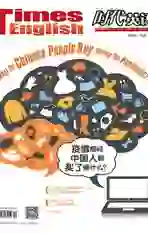Module 1 My First Day at Senior High
2021-03-21
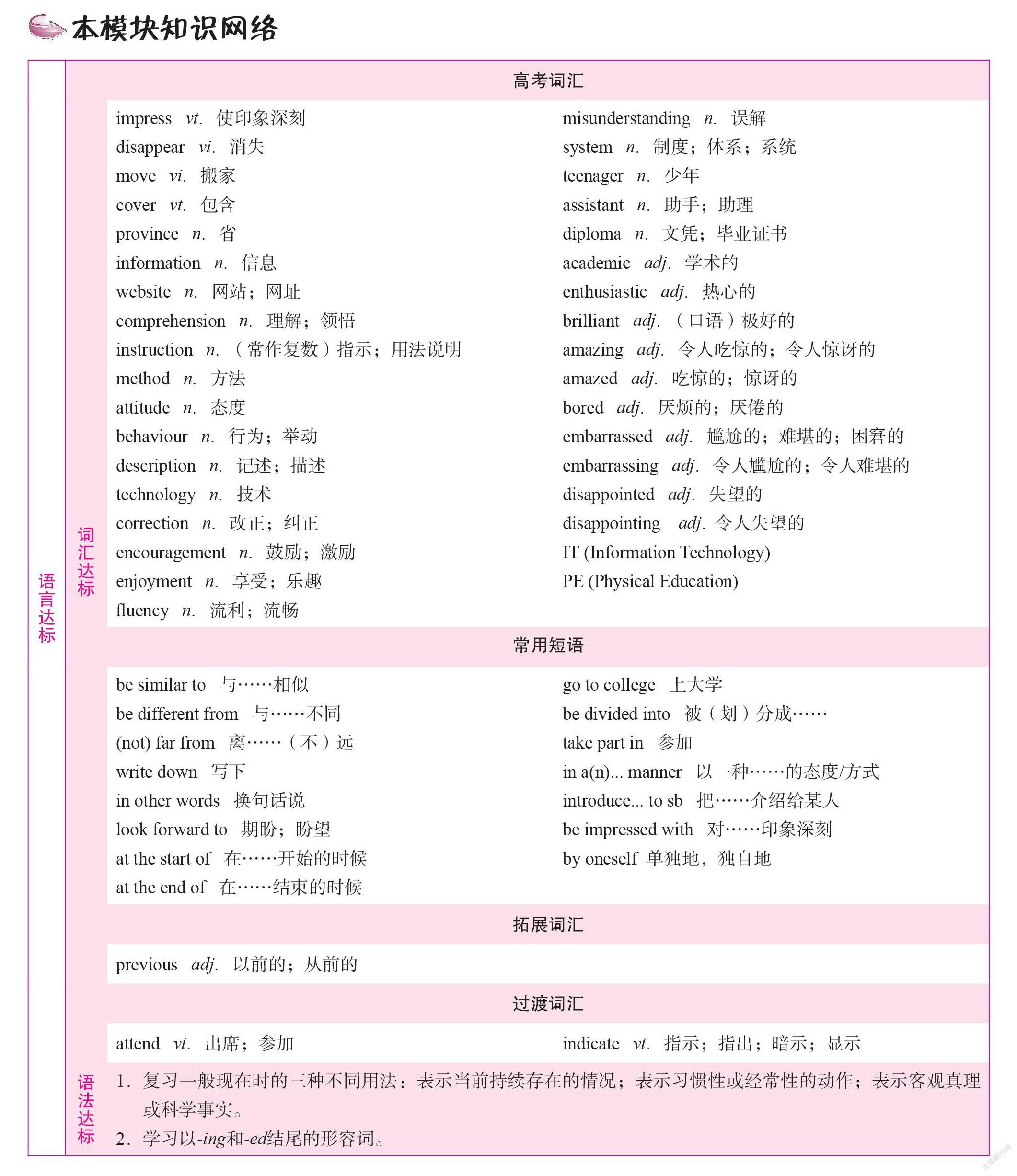
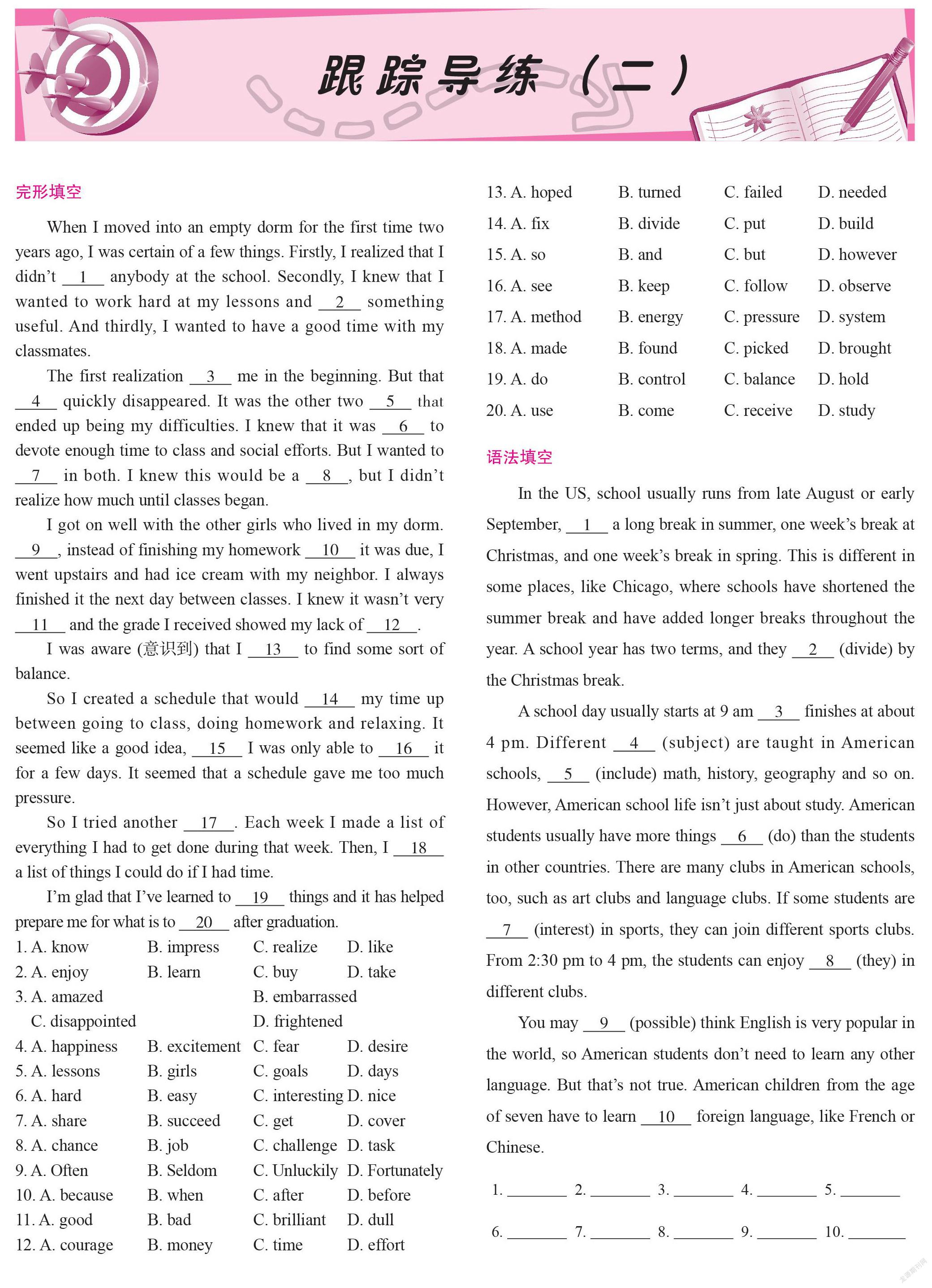
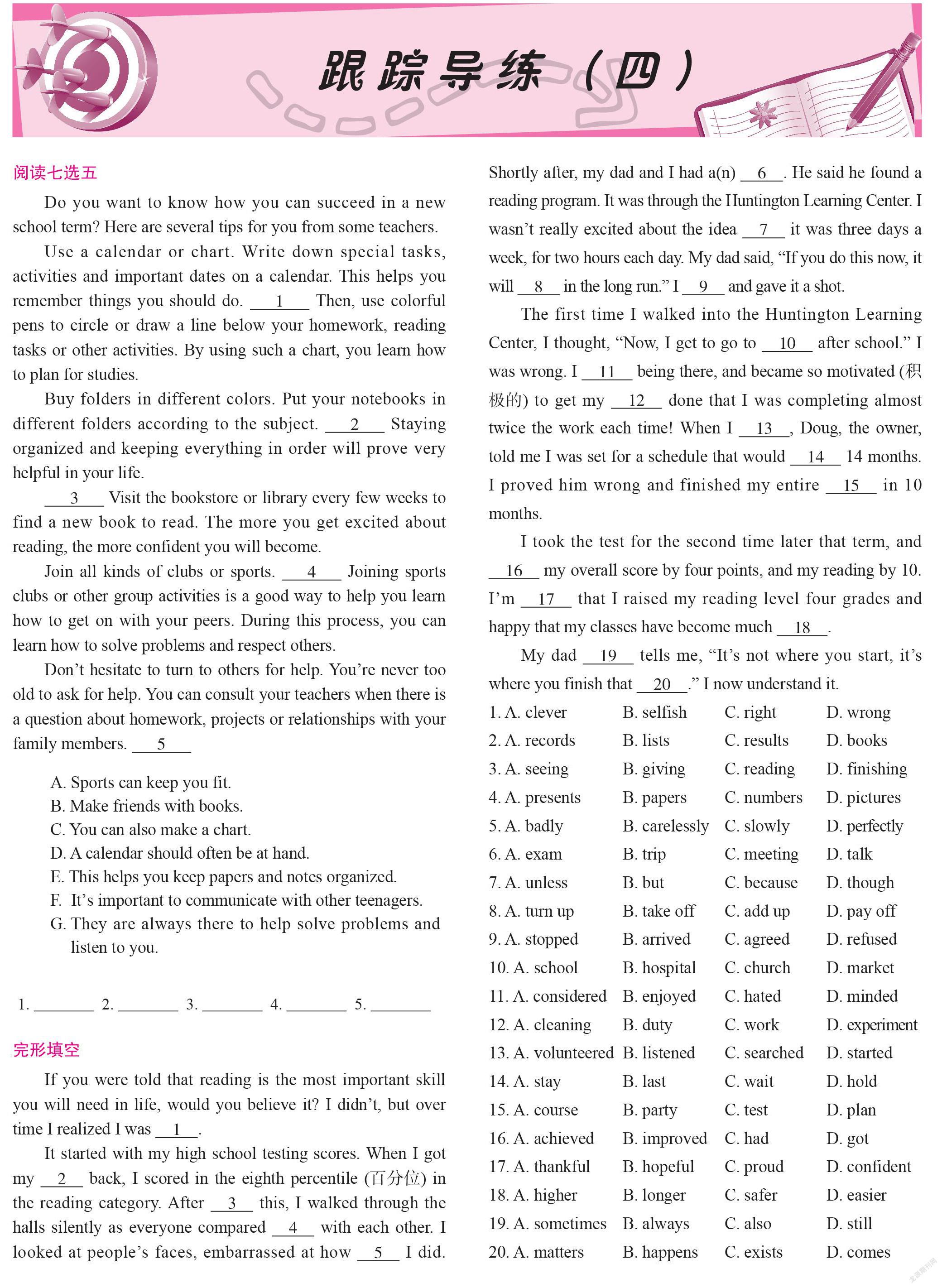

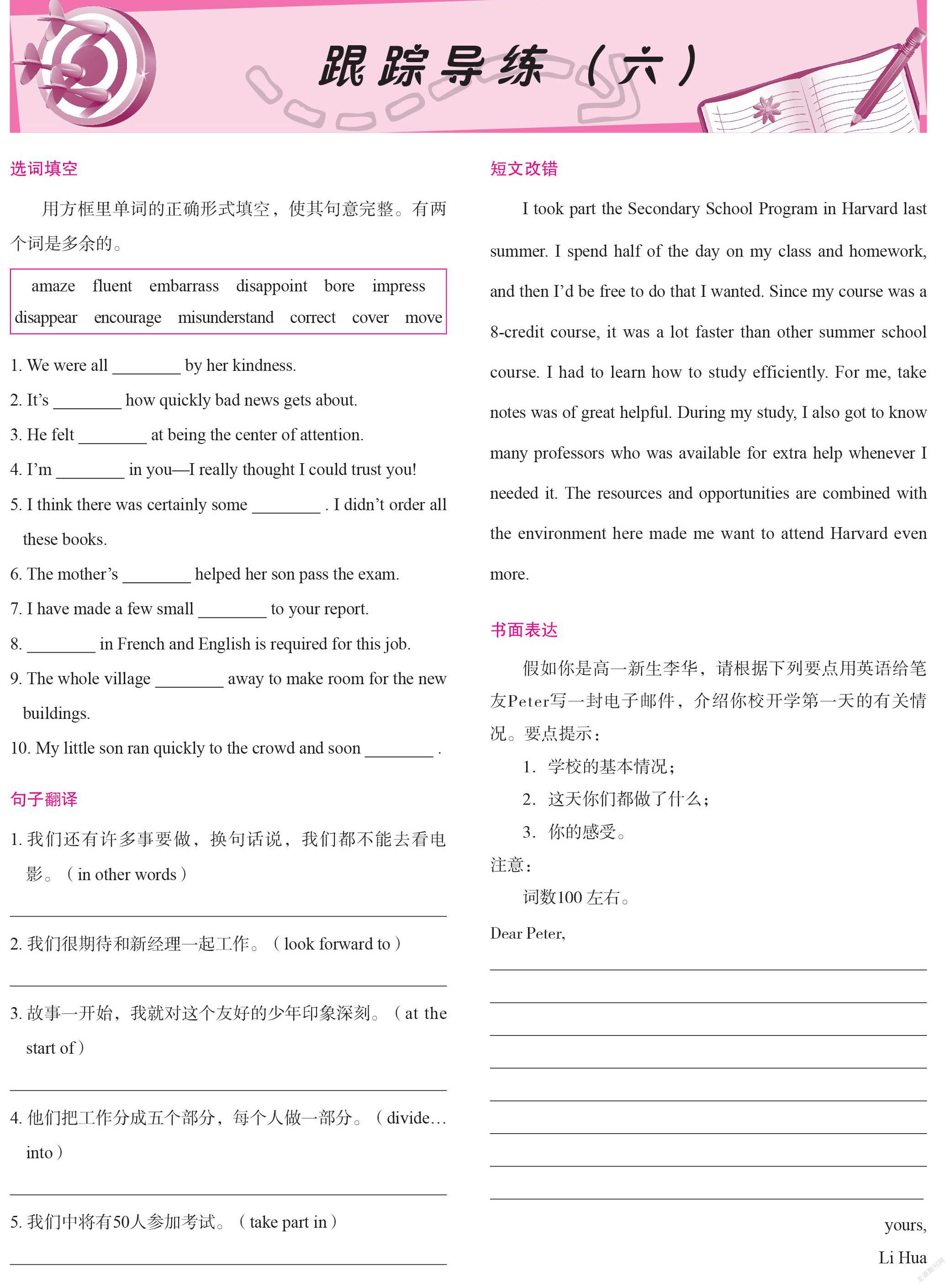

词汇短语园地
1. enjoyment n. 享受;乐趣
The rules are there to ensure everyone’s safety and enjoyment.
这些规定是为了保证每个人的安全和快乐。
Collecting stamps is a great enjoyment to me.
集邮带给我很大的乐趣。
(1)enjoy后接名词或代词。
They are enjoying their dinner.
他们在津津有味地吃晚饭。
(2)enjoy后接动词的-ing形式。
I enjoy listening to light music.
我喜欢听轻音乐。
(3)enjoy后可接反身代词(oneself),构成固定搭配enjoy oneself,意为“过得愉快;玩得高兴”,相当于have a good time。
I enjoyed myself very much at the party.
我在聚会上玩得很开心。
2. impress vt. 使印象深刻
(1)impress为及物动词,意为“给……留下了深刻的印象;使意识到(重要性或严重性等)”。
The film impressed me deeply.
那部影片给我留下了深刻的印象。
His words impressed deeply on my memory.
他的话深深地印在我的脑海里。
(2)被动式be impressed较常用,后可接with/by。
I was greatly impressed by/with the headmaster’s speech.
我被校长的发言深深地感动了。
She was deeply impressed by/with the scenery in Guilin.
桂林的景色給她留下了深刻的印象。
(3)表示“铭刻;使某人牢记某事”用impress sth on/upon sb或impress on/upon sb+that从句。
My father impressed on me the value of hard work.
我父亲叫我牢记勤奋工作的价值。
His parents tried to impress on him that it is necessary to be honest.
他父母尽力让他牢记诚实的必要性。
3. disappointed adj. 失望的;沮丧的;失意的
(1)be disappointed at/by sth 因某事而失望、沮丧
Are you very disappointed at the result of the game?
你对比赛结果是不是很灰心?
I was disappointed by the quality of the wine.
这酒的质量让我失望。
(2)be disappointed in/with sb/sth 对某人/事感到失望
I was disappointed with myself.
我对自己感到很失望。
I’m very disappointed in you.
我对你非常失望。
(3)be disappointed to do sth 做某事感到沮丧
We are disappointed to find the museum closed.
看到博物馆已关闭,我们感到很沮丧。
(4)be disappointed that... 因……失望
I’m disappointed that I didn’t pass the English exam.
我因为没有通过英语考试感到失望。
4. disappear vi. 消失
The two children disappeared from our view.
那两个小孩从我们的视线中消失了。
Her nervousness quickly disappeared once she was on stage.
她一走上舞台,紧张感便迅速消失了。
5. move vi. 搬家;移动;使感动
She had often considered moving to Seattle.
她那时常常考虑搬到西雅图去。
Let’s move this chair to the living room.
我们把这张椅子搬到客厅吧。
He wrote a lot of moving letters. I was moved to tears.
他写了很多感人的信,我感动得流泪。
move away 搬走;迁走 move in 搬进
move off 离去;启动 move on/ahead 前进;进步
move out 搬出去;迁出 move over 挪动;让位
move along 移动一下;向前移动
6. cover vt. 包含;隐藏;保护;覆盖
The lectures covered a lot of subjects.
这些讲座涉及的主题极为广泛。
She covered her face with her hands.
她双手掩面。
Much of the country is covered by forest.
森林覆盖着这个国家的大片土地。
7. method n. 方法
The difference between the two men’s creative methods is enormous.
两个人在创作方法上南辕北辙。
常用搭配:
method of sth/doing sth (做)某事的方法
This is a new method of solving the problem.
这是解决问题的新方法。
It is surprising that they choose this method of passing the evening.
他们选择这种方法度过夜晚,太令人惊奇了!
8. amazing adj. 令人惊异的
amazed adj. 感到惊讶的
What an amazing painting!
多么了不起的一幅油画啊!
We were amazed that he refused to help us.
他拒绝帮助我们,我们感到惊訝。
I was amazed by the news of George’s sudden death.
听到乔治突然去世的消息,我感到惊愕。
His amazing intelligence led him to make many discoveries.
他惊人的智力使他有很多发现。
amaze vt. 使惊异;使惊奇;使吃惊
Her knowledge amazes me.
她的学识令我吃惊。
It amazed me to learn that he had been promoted.
得知他已晋升使我惊奇。
9. bored adj. 厌烦的;厌倦的
常用搭配:be bored with sb/sth/doing sth
He is never bored with teaching.
他对教学工作从不感到厌烦。
The children quickly got bored with staying indoors.
孩子们在屋子里很快就待不住了。
10. information n. 信息
information为不可数名词,没有复数形式。a piece of information表示“一则消息”。
常用搭配:
information on/about sb/sth 有关某人/某事的消息
Pat refused to give her any information about Sarah.
帕特拒绝向她提供任何关于萨拉的消息。
Each centre would provide information on technology and training.
每个中心都会提供技术与培训方面的信息。
11. look forward to 期盼;盼望
look forward to后面只能跟动名词或名词,而且常用be looking forward to表示“一直在期待”。
I am looking forward to seeing you soon.
我一直期待能很快见到你。
I look forward to your reply.
我期盼着你的回复。
12. be divided into 被分成……
The apple was divided into three pieces.
这个苹果被分成三份。
How many parts do you think this passage should be divided into?
你认为这篇文章应分成几个部分?
13. take part in 参加
Will you take part in the English evening?
你将参加英语晚会吗?
We should take an active part in school activities.
我们应该积极参加学校的活动。
比较:take part in,join和join in的区别
(1)take part in指参加群众性活动、会议、劳动、游行等,着重说明句子主语参加该项活动,并在活动中发挥作用。
Take part in something you believe in.
参与到你所信仰的事情当中。
When you take part in any performance, you get out as much as you put in.
你参加任何活动,投入多少力量就会得到多少收获。
(2)join多指参加组织、团体、党派等,并成为其中的一員,后面跟人时表示和某人一起参加某项活动。
I will never forget the day when I joined the Party.
我永远也忘不了入党的那一天。
Will you join us for dinner?
和我们一起吃晚饭好吗?
(3)join in指参加某项游戏或活动,可构成join in sth/doing sth,或join in with sb/sth。
Will you join in our discussion?
你参加我们的讨论吗?
I wish he would join in with the other children.
我希望他能跟别的孩子一块玩。
幽默小对话
The Plural Form of “Child ”
Teacher: What is the plural of man, Tom?
Tom: Men.
Teacher: Good. And the plural of child?
Tom: Twins.
跟踪导练(一)
阅读理解
A
Parents’ meetings may be your worst nightmare (噩梦). However, that’s not always the case. The parents’ meeting we had after our mid-term examinations, for instance, couldn’t have been more surprising.
Sitting in our chairs next to our parents, we felt like we were on pins and needles, expecting a final outburst when they examined our grades and rankings. However, our teacher came to our rescue. He told our parents the stress we faced in our daily school lives and how hard we had worked for the college entrance examination. “No matter the score, they all studied very hard and each one of them has made progress. They deserve encouragement rather than blame,” he said. When they heard these words, many parents nodded, their anger gone. Well, to be honest, we hadn’t worked that hard before the meeting, but we decided we would try our best to live up to our teacher’s expectations after it.
Another highlight of this parents’ meeting was when our parents read our letters that we had written in advance. In our daily lives, we are so busy doing homework and preparing for exams that we hardly have time to communicate with our parents. Yet this parents’ meeting gave us an opportunity to show our appreciation. In the letters, we expressed our love for them and gratitude for everything they had done for us. Many parents burst into tears after reading their children’s letters.
So you see, our parents’ meetings may not be as bad as we think. They could be opportunities to bring us closer to our parents.
1. What does the underlined phrase “on pins and needles” in Paragraph 2 mean?
A. anxious. B. Proud.
C. Curious. D. Sleepy.
2. How did many parents feel before they heard the teacher’s words?
A. Excited. B. Stressful.
C. Disappointed. D. Angry.
3. Who was moved most during the meeting?
A. The students. B. The parents.
C. The teacher. D. The headmaster.
4. What’s the main purpose of the parents’ meeting?
A. To live up to the teacher’s expectations.
B. To bring the teachers and the parents closer.
C. To express students’ love for parents and teachers.
D. To show concern and understanding for the students.
B
Friendships are very important to teenagers. Friendships provide teenagers with chances to develop social (社會的) skills. Teenagers can learn how to end a fight and still remain friends. Friends provide fun and excitement for teenagers through games. Friends also give advice to one another. Teenagers talk through lots of problems with their friends. Friendships also provide help during times of difficulty. It is helpful for teenagers to have a friend who is going through the same situations.
What happens when the youth don’t have friends? Teenagers without friends are usually more lonely and unhappy. They will have lower levels of grades and lower confidence. As they get older, they are more apt to drop out of school.
As kids move into their teenager years, friends and friendships play an important role in teenager life as a way of getting personal enjoyment and social learning.
Most teenagers will have friends who parents either like or dislike. However, it is important to keep in mind that one way teenagers can truly learn how to choose and keep friends is through personal experience, which is sure to have some mistakes. Parents should not be too hard on teenagers when they choose friends who are not good enough or when their friendship fails. Remember, every social experience helps teenagers to lean about different people and improve social skills.
As parents, it is important to encourage friendships among teenagers. However, it is important to know who your teenager’s friends are and to communicate openly about changes in friendships with your teenagers.
5. How many advantages of friends and friendship are mentioned in Paragraph 1?
A. Three. B. Four. C. Five. D. Six.
6. What does the underlined part probably mean?
A. They are more likely to graduate from school.
B. They get better grades and leave school earlier.
C. They have a higher chance of leaving school earlier.
D. They are good at dealing with social problems after school.
7. How can teenagers learn to choose and keep friends?
A. Through their own experience.
B. By taking part in more clubs.
C. By reading more books.
D. Through the Internet.
8. Who are the most possible readers of the text?
A. Teachers. B. Teenagers.
C. Researchers. D. Parents.
跟踪导练(二)
完形填空
When I moved into an empty dorm for the first time two years ago, I was certain of a few things. Firstly, I realized that I didn’t 1 anybody at the school. Secondly, I knew that I wanted to work hard at my lessons and 2 something useful. And thirdly, I wanted to have a good time with my classmates.
The first realization 3 me in the beginning. But that 4 quickly disappeared. It was the other two 5 that ended up being my difficulties. I knew that it was 6 to devote enough time to class and social efforts. But I wanted to 7 in both. I knew this would be a 8 , but I didn’t realize how much until classes began.
I got on well with the other girls who lived in my dorm. 9 , instead of finishing my homework 10 it was due, I went upstairs and had ice cream with my neighbor. I always finished it the next day between classes. I knew it wasn’t very 11 and the grade I received showed my lack of 12 .
I was aware (意識到) that I 13 to find some sort of balance.
So I created a schedule that would 14 my time up between going to class, doing homework and relaxing. It seemed like a good idea, 15 I was only able to 16 it for a few days. It seemed that a schedule gave me too much pressure.
So I tried another 17 . Each week I made a list of everything I had to get done during that week. Then, I 18 a list of things I could do if I had time.
I’m glad that I’ve learned to 19 things and it has helped prepare me for what is to 20 after graduation.
1. A. know B. impress C. realize D. like
2. A. enjoy B. learn C. buy D. take
3. A. amazed B. embarrassed
C. disappointed D. frightened
4. A. happiness B. excitement C. fear D. desire
5. A. lessons B. girls C. goals D. days
6. A. hard B. easy C. interesting D. nice
7. A. share B. succeed C. get D. cover
8. A. chance B. job C. challenge D. task
9. A. Often B. Seldom C. Unluckily D. Fortunately
10. A. because B. when C. after D. before
11. A. good B. bad C. brilliant D. dull
12. A. courage B. money C. time D. effort
13. A. hoped B. turned C. failed D. needed
14. A. fix B. divide C. put D. build
15. A. so B. and C. but D. however
16. A. see B. keep C. follow D. observe
17. A. method B. energy C. pressure D. system
18. A. made B. found C. picked D. brought
19. A. do B. control C. balance D. hold
20. A. use B. come C. receive D. study
語法填空
In the US, school usually runs from late August or early September, a long break in summer, one week’s break at Christmas, and one week’s break in spring. This is different in some places, like Chicago, where schools have shortened the summer break and have added longer breaks throughout the year. A school year has two terms, and they (divide) by the Christmas break.
A school day usually starts at 9 am finishes at about 4 pm. Different (subject) are taught in American schools, (include) math, history, geography and so on. However, American school life isn’t just about study. American students usually have more things (do) than the students in other countries. There are many clubs in American schools, too, such as art clubs and language clubs. If some students are (interest) in sports, they can join different sports clubs. From 2:30 pm to 4 pm, the students can enjoy (they) in different clubs.
You may (possible) think English is very popular in the world, so American students don’t need to learn any other language. But that’s not true. American children from the age of seven have to learn foreign language, like French or Chinese.
1. 2. 3. 4. 5.
6. 7. 8. 9. 10.
跟踪导练(三)
阅读理解
A
Richard Campbell is a secondary school student. He is 15 years old. He lives in a small town in the north of England. Every morning, he gets up at eight o’clock, puts on his uniform and walks to school.
One hour later, the lessons start. The students usually study math, English, history and geography in the morning. They usually study music and drawing and they play sports after lunch. They have a ten-minute break between classes. They also spend a long time in the school library reading books and doing their homework.
Richard likes his school very much. His favorite subjects are English and geography, but he doesn’t like math because he is not good at it. Richard and all his friends spend the whole day at school. Lunch is at one o’clock. He doesn’t like the food that the school serves. This is why he often brings a packed lunch from home. He always has his lunch in the dining hall but some of his friends sometimes eat in the courtyard or outside the school gate.
At weekends, he always goes out with his friends because he doesn’t go to school. On Saturday, he always goes to the cinema or to the sports center. On Sunday, he just goes for a walk with his dog.
1. What time do Richard’s lessons begin in the morning?
A. At 8:00. B. At 8:30.
C. At 9:00. D. At 9:10.
2. What does Richard like best?
A. Math and English. B. English and geography.
C. History and math. D. Geography and history.
3. Where does Richard have lunch on weekdays?
A. In the dining hall. B. At home.
C. In the courtyard. D. Outside his school gate.
4. What does Richard always do on Saturday?
A. He reads and does homework.
B. He goes to see films or does sports.
C. He walks his dog or does exercise.
D. He spends a long time in the library.
B
When you were a kid, did you ever draw pictures in the dirt with sticks? There is a man named Stan Herd who is very skilled at playing in dirt!
Stan Herd was born into a family of farmers in 1950 and grew up in a very small town in Southwest Kansas. He was a talented painter. When he started doing murals (壁畫) he realized he enjoyed doing a huge work of art. Then, while flying over a field once, he got the idea of using the earth as his canvas (画布). In 1976, he returned to farming roots and invented a new form of artwork called “crop art” or “Earthworks”. Herd is the first known American to use the earth as canvas.
To create these giant designs, Herd usually starts by making an outline (轮廓) with bricks. After that, he begins filling in the area with materials. These can range from different colors of dirt, sand, and rocks to different types of plants and flowers. Herd often uses local volunteers to help with his projects because his projects are too big for just one person. While he is creating his pieces, he sometimes looks at them by going up in a hot air balloon, but usually he just creates his work based on his previous experience.
Herd’s personal artwork frequently focuses on the theme of farm life. Herd comes from a family of farmers. His art aims to show respect for their hard work. He has also devoted his time to creating an earthen medicine wheel at Haskell Indian Nations University—a big project that he is very proud of. Through years of practice, he created his own art form by combining his farm upbringing with his love of art.
5. Herd thought of using crop fields as his canvas when ___ .
A. he was working in a field
B. he was creating a large mural
C. he was drawing pictures in the dirt
D. he was flying over a field by plane
6. What is Paragraph 3 mainly about?
A. How Herd creates his works.
B. How Herd helps local volunteers.
C. How Herd gets the ideas for his designs.
D. How Herd has a bird’s-eye view of his works.
7. Why did Herd use farm life as the theme of his works?
A. He had deep feelings about it.
B. He had lived on a farm for a long time.
C. He thought it would make him popular.
D. He was influenced by local painting traditions.
8. According to the last paragraph, what words can best describe Herd?
A. Popular but serious.
B. Friendly and honest.
C. Talented and hard-working.
D. Talented but narrow-minded.
跟蹤导练(四)
阅读七选五
Do you want to know how you can succeed in a new school term? Here are several tips for you from some teachers.
Use a calendar or chart. Write down special tasks, activities and important dates on a calendar. This helps you remember things you should do. Then, use colorful pens to circle or draw a line below your homework, reading tasks or other activities. By using such a chart, you learn how to plan for studies.
Buy folders in different colors. Put your notebooks in different folders according to the subject. Staying organized and keeping everything in order will prove very helpful in your life.
Visit the bookstore or library every few weeks to find a new book to read. The more you get excited about reading, the more confident you will become.
Join all kinds of clubs or sports. Joining sports clubs or other group activities is a good way to help you learn how to get on with your peers. During this process, you can learn how to solve problems and respect others.
Don’t hesitate to turn to others for help. You’re never too old to ask for help. You can consult your teachers when there is a question about homework, projects or relationships with your family members.
A. Sports can keep you fit.
B. Make friends with books.
C. You can also make a chart.
D. A calendar should often be at hand.
E. This helps you keep papers and notes organized.
F. It’s important to communicate with other teenagers.
G. They are always there to help solve problems and listen to you.
1. 2. 3. 4. 5.
完形填空
If you were told that reading is the most important skill you will need in life, would you believe it? I didn’t, but over time I realized I was .
It started with my high school testing scores. When I got my back, I scored in the eighth percentile (百分位) in the reading category. After this, I walked through the halls silently as everyone compared with each other. I looked at people’s faces, embarrassed at how I did. Shortly after, my dad and I had a(n) . He said he found a reading program. It was through the Huntington Learning Center. I wasn’t really excited about the idea it was three days a week, for two hours each day. My dad said, “If you do this now, it will in the long run.” I and gave it a shot.
The first time I walked into the Huntington Learning Center, I thought, “Now, I get to go to after school.” I was wrong. I being there, and became so motivated (積极的) to get my done that I was completing almost twice the work each time! When I , Doug, the owner, told me I was set for a schedule that would 14 months. I proved him wrong and finished my entire in 10 months.
I took the test for the second time later that term, and my overall score by four points, and my reading by 10. I’m that I raised my reading level four grades and happy that my classes have become much .
My dad tells me, “It’s not where you start, it’s where you finish that .” I now understand it.
1. A. clever B. selfish C. right D. wrong
2. A. records B. lists C. results D. books
3. A. seeing B. giving C. reading D. finishing
4. A. presents B. papers C. numbers D. pictures
5. A. badly B. carelessly C. slowly D. perfectly
6. A. exam B. trip C. meeting D. talk
7. A. unless B. but C. because D. though
8. A. turn up B. take off C. add up D. pay off
9. A. stopped B. arrived C. agreed D. refused
10. A. school B. hospital C. church D. market
11. A. considered B. enjoyed C. hated D. minded
12. A. cleaning B. duty C. work D. experiment
13. A. volunteered B. listened C. searched D. started
14. A. stay B. last C. wait D. hold
15. A. course B. party C. test D. plan
16. A. achieved B. improved C. had D. got
17. A. thankful B. hopeful C. proud D. confident
18. A. higher B. longer C. safer D. easier
19. A. sometimes B. always C. also D. still
20. A. matters B. happens C. exists D. comes
跟蹤导练(五)
阅读理解
Tonya, Elsa and Mark are students at LaGuardia High School in New York City. It’s a school with regular academic classes, but it also gives special attention to the performing arts. Tonya likes dancing, Elsa wants to be an artist and Mark is a singer.
The students are all 15, and they’re in 10th grade. They study subjects like English, math, social studies, science and PE. They also choose a foreign language: French, Italian, Spanish or Japanese. Students have many academic classes, but during the school day they also take classes in the arts, like theater, art, dance and music. Mark says, “I get the basic classes, but I also take a voice class and a music history class.”
There is even more for LaGuardia students after school. There are more than 40 clubs for students. For example, there’s a movie club, a music club and an environment club. “We have so many choices here,” says Tonya. “My favorite club is the camera club. I like taking photos. It’s also a great way to meet people with common interests.”
Students at LaGuardia can also do many sports. For example, they can play basketball, tennis, volleyball and soccer. Elsa is on the gymnastics team. She says, “I like being on a team. It makes me work hard and do my best.” Students practice after school. They compete against other high schools. Mark says, “At school, I study by myself. I’m a singer, and I do that alone, too. That’s why I like playing on the basketball team. We work together and compete against other teams.”
LaGuardia offers many great classes, clubs and sports for students. Students at LaGuardia get a good education and they also develop their own interests. Many LaGuardia students become dancers, singers and actors!
1. What do we know about LaGuardia High School?
A. Students take art classes at night.
B. It places great importance on arts.
C. Students have few subjects to choose from.
D. It aims to develop students’ language skills.
2. Which club does Tonya like most?
A. The camera club. B. The music club.
C. The movie club. D. The environment club.
3. Why does Mark enjoy playing on the basketball team?
A. He can try his best.
B. He likes teamwork.
C. He can make more friends.
D. He hopes to build up his health.
4. What is the best title for the text?
A. Education in New York
B. Top Students at LaGuardia
C. School Life at LaGuardia
D. LaGuardia’s After-school Activities
閱读七选五
How to Handle Being the New Kid at School
Being the new kid at school can be a terrible experience! But remember you are not alone. Actually, everybody is nervous on their first day and you can fit right in with the help of the following tips.
Plan ahead the night before. Lay out your first day outfit (全套服装) and make sure you have all your school supplies ready to go. Planning ahead can help you get a good night’s sleep and feel less nervous about your first day.
Make sure your clothes are cleaned and that you’ve showered. If you’re hoping to attract friends with similar interests, try wearing a shirt with your favorite show or sports team on it.
Try to stay calm and be positive. If you feel nervous, start by taking some deep breaths. You can listen to music that makes you feel calm or happy. Try imagining a good first day in your mind instead of keeping thinking about things that could go wrong.
Use your body language to show confidence. Walk with your head held up, your back straight, and a bright expression on your face. Make eye contact with other people, and smile if they look at you or speak to you.
A. This can be an easy way to start a talk.
B. Choose clothes that make you feel great.
C. Introduce yourself to your teachers and classmates.
D. Remember that everyone is the new kid at some point.
E. Keep talking and let people know that you are friendly.
F. You’ll feel less worried if everything is ready before you go to bed.
G. Don’ t come in with your head hanging down and your eyes on the floor.
1. 2. 3. 4. 5.
跟踪导练(六)
选词填空
用方框里单词的正确形式填空,使其句意完整。有两个词是多余的。
amaze fluent embarrass disappoint bore impress
disappear encourage misunderstand correct cover move
1. We were all by her kindness.
2. It’s how quickly bad news gets about.
3. He felt at being the center of attention.
4. I’m in you—I really thought I could trust you!
5. I think there was certainly some . I didn’t order all these books.
6. The mother’s helped her son pass the exam.
7. I have made a few small to your report.
8. in French and English is required for this job.
9. The whole village away to make room for the new buildings.
10. My little son ran quickly to the crowd and soon .
句子翻译
1. 我们还有许多事要做,换句话说,我们都不能去看电影。(in other words)
2. 我们很期待和新经理一起工作。(look forward to)
3. 故事一开始,我就对这个友好的少年印象深刻。(at the start of)
4. 他们把工作分成五个部分,每个人做一部分。(divide… into)
5. 我们中将有50人参加考试。(take part in)
短文改错
I took part the Secondary School Program in Harvard last summer. I spend half of the day on my class and homework, and then I’d be free to do that I wanted. Since my course was a 8-credit course, it was a lot faster than other summer school course. I had to learn how to study efficiently. For me, take notes was of great helpful. During my study, I also got to know many professors who was available for extra help whenever I needed it. The resources and opportunities are combined with the environment here made me want to attend Harvard even more.
書面表达
假如你是高一新生李华,请根据下列要点用英语给笔友Peter写一封电子邮件,介绍你校开学第一天的有关情况。要点提示:
1﹒学校的基本情况;
2﹒这天你们都做了什么;
3﹒你的感受。
注意:
词数100 左右。
Dear Peter,
American Senior High School Life
美国的高中生活
In America, after junior high school comes senior high school, which includes grades 9 through 12. Students are required to take certain subjects like English, social studies, math, science, and physical education. In addition, they choose among elective subjects to complete their high school education. Elective subjects include technology, music, art, and foreign languages.
Each student in the school has their own locker for books and personal items. This convenience saves students from carrying textbooks, and allows students a small space they can decorate with posters and favorite objects.
Cheating in any form is strictly prohibited in American schools. And in fact, high school students usually don’t cheat. A student caught in plagiarism, forgery, or copying another student faces severe discipline, even expulsion.
在美国,初中学业一结束就进入高中。高中包括9到12年级,学生们要完成某些必修课,如英语、社会学、数学、自然科学和体育。此外,学生们选修一些课程来完成高中教育,选修科目有科技、音乐、美术和外语。
每位学生在学校都有自己的储物柜,用来存放书本或私人物品。这很方便,学生们不需要携带课本,而且还使得他们有个小小的空间,可以装饰海报及心爱之物。
任何形式的作弊在美国学校里都是严令禁止的。事实上,高中生们一般不会作弊。若学生在剽窃、弄虚作假或抄其他学生的作业时被发现,都会受到严厉的处分,甚至是开除。
Each school holds certain yearly activities for the entire school body, such as homecoming, prom night and holiday celebrations.
Homecoming is celebrated each fall, usually on a weekend, and events leading up to it may last all week. While homecoming is celebrated differently at each school, it usually includes a parade and the crowning of the Homecoming King and Queen, and ends with a football game and school dance.
The prom is a formal dance for students in grades 11 and 12, and is generally anticipated as the most important social event of the school year. It can also be a time of anxiety, as boys have to work up the courage to ask a date to the prom, and girls hope the right boy invites them. These couples dress in formal clothes—girls in long gowns, boys in suits. At the prom, students dance, have snacks and drinks, and chat. Prom usually ends with a Prom King and Queen being announced and crowned on stage before an envious audience.
各學校每年都会举办一些全校性活动,如返校节、学年舞会、节日庆典等。
返校节在每年秋季举办,通常选在周末,相关活动可能持续一周。每所学校举办返校节的方式有所不同,不过通常都包括游行、返校节“舞会国王”与“舞会王后”的加冕,并以橄榄球赛及全校性舞会来压轴。
学年舞会是为11和12年级学生举办的正式舞会。学生通常会把它看成是学年中最重要的社交活动。这也是令人焦躁不安的时刻,因为男孩子们得鼓足勇气寻找舞伴去参加这个舞会,而女孩子们则希望自己的意中人能向自己发出邀请。男生女生要着正式服装(女孩子穿长礼服,男孩子着西装)。舞会上,学生们翩翩起舞、吃点心、喝饮料、轻松地闲聊。舞会临近尾声时,会公布“舞会国王”及“舞会王后”的名字。在一群艳羡的观众前,“国王”和“王后”登台加冕。
3581500589243
